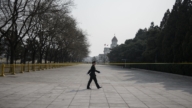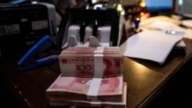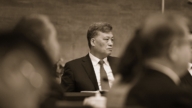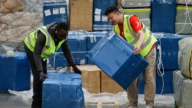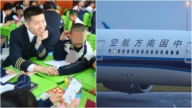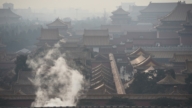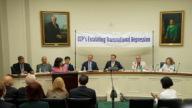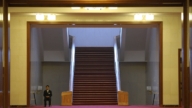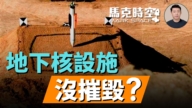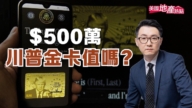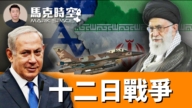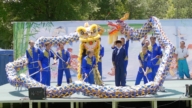【新唐人2012年1月18日讯】台湾总统选举吸引了一些大陆学者赴台湾观选战。专门研究选举的学者表示,台湾的选举说明,香港和华人社会也可以进行民主选举,华人社会都可以搞民主,学者们期望中共高层也能出个蒋经国。但一些民主人士指出,被庞大官僚利益集团控制的中共,不可能进行政治改革,更不可能进行民主选举。
台湾总统选举吸引了一些大陆学者到台湾参观选举并且交流,当中包括“厦门大学台湾研究所”人员,和因八九年“六四事件”而关闭的原“中国经济体制改革研究所”人士。
在“2012年中华民国总统暨国会改选后的两岸新情势”研讨会上,观选的“世界与中国研究所”所长李凡发言指出,台湾选举并不是像外界所指的乱,而是热闹,是最热闹、最有朝气的选举。他说,“台湾选举让大家明白,香港和华人社会都可以进行民主选举,华人社会都可以搞民主,都可以搞好的民主。香港民主发展对大陆很有影响。”
同时,2012台湾大选也受到外界的广泛赞誉,认为:“整个过程意识形态淡了,抹黑少了,更显理性、平和与成熟!”
“中国社会民主党”中央委员会主持人刘因全:“台湾的民主选举,反映了中国人、中华民族是有能力进行民主选举的,并不像中国共产党说的那样,中国不适合民主选举。民主选举这种普世的价值是适合中国国情的。”
刘因全认为,庞大的中共官僚集团从现有的体制中获得了很大的利益,他们不愿意放弃这种利益,因此阻止任何体制改革。
刘因全:“通过我的经验,我亲身体会、我办的事情和遭遇,我感到共产党不可能实行民主选举,像台湾那样来选举总统。”
不过,李凡在接受访问时指出,现时的民间力量仍不足以推动中国大陆的政治改革。他呼吁十八大领袖能仿效蒋经国。
24年前的台湾总统蒋经国解除报禁和戒严、开放党禁。这些决定打开了台湾民主化进程的“闸门”,也使多党竞选总统和国会立委成为可能。
刘因全:“共产党他们不可能从台湾经验中来学习,他们不会像台湾那样开放党禁、报禁,来实行民主选举。他一直加强它的一党专制,没有任何迹象来进行体制改革。”
刘因全曾在2006年发表论文,建议解决中共干部的腐败,他提出,由人民选举监察院的干部。不过不久后,中共负责政法委的罗干却表示将加强对监察机构的领导。对此,刘因全认为,中共连基层的村长、镇长都不能实行民主选举,连监察权都不放,哪来的民主选举?
另外,“中国冤民大同盟”总干事张兆林表示,生活在中共统治下就是一种悲哀,现在中国到处都在反抗暴政,但新闻一点也不报导。中共一直是广告方式的自我宣传,欺骗百姓。“新闻自由”是中共为维护统治而不能碰的底线。
张兆林:“共产党说的好听,他自己说自己怎么好。实际上,人民说你好,那才是好,人民不说你好,好在哪?再一个,辛亥革命一百年了,100年(后)的中国还是没有民主,还是独裁,言论不自由、新闻不自由。一自由了,老百姓都知道了,执政党就受到挑战了。”
可是,打破台湾独裁体制的蒋经国受到了历史的高度评价。马英九曾在《怀念蒋经国先生》一文说:“十五年来,在任何一个‘谁对台湾贡献最大? ’的民调中,经国先生始终高居第一。”
新唐人记者唐睿、宋风、萧宇采访报导。
China’s Scholars Learn From Taiwan’s Elections?
Taiwan’s presidential elections attracted a number of scholars
from mainland China to personally watch the elections.
Experts think, with its Chinese population,
Taiwan can be an example for democratic elections in China.
Some scholars’ hopes are on Chiang Ching-kuo
from the Chinese Communist Party’ (CCP) high-levels.
However, democracy activists said it is not possible for CCP,
ruled by large bureaucratic interests, to do a political reform.
And it is even less possible for the CCP
to have democratic elections.
Taiwan’s presidential election attracted a number of scholars
from mainland China to gather ideas.
They include staff from Xiamen University Taiwan Research
Institute and former China Economic System Reform Institute.
China Economic System Reform Institute was closed in 1989,
due to the June Fourth Incident.
During a seminar, the president of World and China Institute,
Li Fan, said Taiwan’s elections are not as chaotic as described.
They are lively. They are the liveliest
and exciting elections.
He said, “Taiwan’s elections let everyone know Hong Kong
and other Chinese societies can have democratic elections.
Democracy can be implemented well
in a Chinese society.
The development of democracy in Hong Kong
will have a great influence on the Mainland."
Meanwhile, 2012 Taiwan elections have received
extensive praises from the outside world.
“The whole process is less ideological, less discrediting,
more rational, peaceful and matured,” it was said.
Liu Yinquan, (Chairman, Social Democratic Party of China):
“Taiwan’s democratic elections reflect that the Chinese people
and nation are capable of conducting democratic elections.
Unlike what the CCP says,
that China is not suitable for democratic elections.
The value of democracy,
as a universal value, suites China.”
Liu Yinquan thinks the large Chinese bureaucracy
received huge benefits from the existing system.
They do not want to give up such an interest,
thus preventing any political reform.
Liu Yinquan: “Based on my experience, I do not think
CCP will conduct democratic elections, like these in Taiwan.”
However, Li Fan said in an interview that non-governmental
forces are still not sufficient for a political reform in China.
He called on the 18th Congress leaders
to follow Chiang Ching-kuo.
24 years ago, Taiwan’s President Chiang Ching-kuo lifted
the martial law, the press censorship and the CCP ban.
This opened up Taiwan’s democratization process, making
possible for multi-party elections and Congress legislators.
Liu Yinquang: “It is not possible for the CCP
to learn from the experience of Taiwan.
It will not lift the ban on the press,
or carry out democratic elections.
It has been strengthening its one-party dictatorship,
without any sign for political reform."
Liu published a paper in 2006, suggesting how to solve
the corruption issues within the CCP.
He suggested that the Inspection Bureau cadres
should be elected by the people.
Shortly after, Luo Gang, CCP’s Political and Law Committee’
head, said the CCP would strengthen its leadership in this area.
Liu thinks that CCP does not even allow democratic elections
at grass-root level, nor at the inspection organizations’ level.
How can it allow general democratic elections?
In addition, general director of Chinese League of Victims,
Zhang Zhaolin said it is sad to live under CCP’s rule and nothing is reported in the news.
The CCP’s propaganda is like self-promoting advertisement,
cheating the people.
Freedom of the press is the bottom line of the CCP’s control,
that cannot be touched.
Zhang Zhaolin: “What the CCP says sounds good.
The CCP always praises itself.
In fact, whether you are good or not
depends on what people say.
If people do not say you are good,
then how are you good?
The Xihai Revolution happened a hundred years ago.
The current China still has no democracy.
China is still under dictatorship,
with no freedom of speech or of the press.
A freedom will provide knowledge and truth to people,
who will then challenge the CCP."
Chiang Ching-kuo, who put an end to the dictatorship system
in Taiwan, is highly praised in history.
Ma Ying-jeou wrote an article,
titled, ‘In memory of Chiang Ching-kuo.’
In it he says: “In the last fifteen years, in any poll on ‘Who has
the greatest contribution to Taiwan?’ Mr. Chiang always ranks number one."
NTD reporters Tang Rui, Song Feng and Xiao Yu


